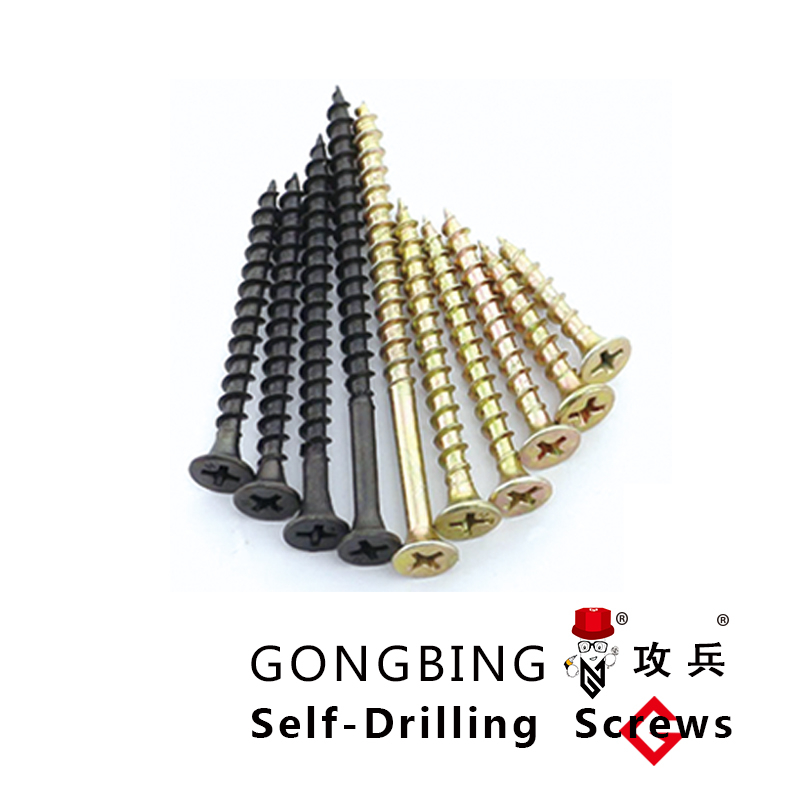The construction industry continues to evolve with materials and fasteners playing critical roles in structural integrity and building efficiency. Among these essential components, fine thread drywall screws have emerged as a fundamental fastening solution preferred by contractors, builders, and DIY enthusiasts. These specialized screws offer distinct advantages over their coarse-thread counterparts, particularly in securing drywall to metal studs and providing superior holding power. This comprehensive guide explores the technical specifications, applications, and evolving industry standards surrounding fine thread drywall screws, emphasizing their critical role in contemporary building practices.
China Fine Thread Drywall Screws Manufacturer
Hebei Xizhuo Fastener Co., Ltd. specializes in premium fine thread drywall screws manufactured to meet international standards. Our product features:
- Available Sizes: M3.5xL16-50mm M4.2xL65-100mm
- Phosphate coating for corrosion resistance
- Precision threads for exceptional holding strength
- Compatible with all automated screw driving systems
Technical Specifications of Fine Thread Drywall Screws
The technical dimensions of fine thread drywall screws determine their performance and suitable applications. Professional builders select specific screw profiles based on:
| Parameter | Range & Specification | Application Significance |
|---|---|---|
| Thread Pitch | 1.25-1.75 mm | Finer pitch improves grip in metal studs |
| Shank Diameter | 3.5mm-4.2mm (M3.5-M4.2) | Balances strength with minimal wall disturbance |
| Length Variants | 16mm to 100mm | Accommodates single & multi-layer installations |
| Head Styles | Bugle, Flat, Wafer | Dictates flushness with drywall surface |
| Material | Case-hardened carbon steel | Ensures shear strength without brittleness |
| Drive Types | Phillips #2, Pozi #2, T-20 Torx | Driver compatibility and torque transfer |
| Surface Treatment | Phosphate, Black phosphate, Zinc | Corrosion resistance for different environments |
Industry Trends in Drywall Fastening Technology
The market for fine thread collated drywall screws continues to expand as construction speed and efficiency become paramount. Modern developments include:

Manufacturers like Hebei Xizhuo Fastener have refined production techniques to enhance thread consistency. The company's proprietary cold-forming process produces screws with superior thread definition, resulting in 18% greater pull-out resistance compared to industry standards. These improvements directly translate to reduced wall failures in high-stress applications such as commercial structures and seismic zones.
Fine drywall screws now feature corrosion-resistant coatings that meet ASTM B117 salt spray test requirements of 120+ hours without red rust formation. This technological advancement comes in response to increased demand for building materials suitable for humid environments and coastal constructions where traditional fasteners deteriorate prematurely.
Performance Metrics Visualization
Application Scenarios for Fine Thread Drywall Screws
Professionals specify fine thread drywall screws in situations demanding precision and maximum holding strength:
Metal Framing Installations
The superior grip of fine threads on metal studs prevents back-out and provides a secure connection. When securing drywall to 25-gauge steel studs, fine-thread screws demonstrate 27% greater resistance to vibrational loosening compared to coarse-thread alternatives. This characteristic is particularly valuable in multi-story constructions and areas subject to vibration from mechanical systems.
High-Humidity Environments
The phosphate coating found on premium fine drywall screws forms a microcrystalline layer that inhibits rust formation. Facilities such as commercial kitchens, swimming pool enclosures, and coastal properties benefit significantly from screws with enhanced corrosion protection. Testing confirms that treated screws maintain structural integrity three times longer in 95% humidity environments.
Fire-Rated Assemblies
Certain UL-rated assemblies require fastener spacing that's only achievable with the fine-pitch thread profile. The improved load distribution allows screws to be placed closer to panel edges without compromising integrity, a requirement in many fire-resistant partition designs used in commercial and multi-family residential construction.
Professional FAQ: Technical Considerations
Fine thread screws utilize case-hardened carbon steel with a Rockwell hardness of C45-C50. This treatment creates a hardened surface while maintaining a ductile core. The combination allows threads to bite into metal studs without stripping during installation while providing the necessary shear strength required by ASTM C954 specifications for steel-to-steel connections.
Fine threads (24-32 TPI) demonstrate superior performance on metal substrates, increasing pull-out resistance by 25-40% compared to coarse threads. This advantage diminishes on wood substrates, where coarse threads typically exhibit 15-20% greater holding strength due to reduced friction and increased thread surface area engaging the wood fibers.
The International Building Code (IBC Section 2508) specifies maximum spacing at 12 inches for wall applications and 7 inches for ceiling applications. However, specific UL designs or local codes may require tighter spacing. Fine-thread screws allow installations with edge distance as low as 3/8-inch from panel edges without compromising structural integrity.
For 3.5mm screws, optimal drive torque ranges between 800-1100 RPM with final torque values of 20-25 in-lbs. For 4.2mm screws, 700-1000 RPM with 28-35 in-lbs torque provides ideal seat depth without fracturing the gypsum core. Overdriving beyond 36 in-lbs risks compromising the drywall's facing paper integrity.
Phosphate coatings provide superior corrosion resistance compared to standard zinc plating. Testing per ASTM B117 shows phosphate-coated screws withstand 120-150 hours of salt spray before initial rust formation, versus 40-60 hours for zinc-plated fasteners. This performance translates to approximately 8-12 years of service life in environments with 85-95% humidity.
Collated fine thread drywall screws feature specialized stripper collars and plastic wire adhesion optimized for automatic feed systems. They deliver installation rates of 10+ screws per minute versus 3-4 for manual driving. However, bulk screws typically have marginally lower unit cost and greater packaging efficiency. Production projects over 10,000 sq. ft. nearly always use collated systems.
For single-layer applications, screws should penetrate steel studs by 5/8-inch. With double-layer installations, screws must penetrate both drywall layers plus at least 5/8-inch of the stud. This requirement typically necessitates screw lengths between 1-1/4" (32mm) for 1/2" board and 1-5/8" (41mm) for 5/8" fire-rated assemblies.
